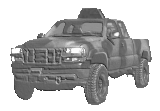|
|
For
participants only. Not for public distribution.
|
Note #28
John Nagle |
Introduction
This is a preliminary version of how to make a QNX image. It's not yet too useful.
Building a bootable CD-ROM
Approach 1
Makes a CD-ROM bootable on desktop-type PCs.This is a bit clunky, requiring two computers and a floppy drive. We hope to simplify this process shortly.Requires:
- A working QNX development machine with QNX 6.2.1 NC or QNX 6.2.1 PE.
- A floppy drive and blank diskette.
- A Windows or Linux machine with a CD writer, and a CD-R blank.
- A network connection between the two computers.
- The program "mkisofs".
- The QNX program "mkifs".
- The base QNX components "bios.boot", "startup-bios", and "procnto".
Step 1 - build a QNX image
This process is explained in standard QNX help files. Start with the
documentation roadmap, and read "Building Embedded Systems", expecially
"Chapter 2, making an OS image". Briefly, you collect together all
the necessary component files, write a ".bld" file (here named "demo.bld")
which describes how to put the components together, and run
mkisofs demo.bld demo.ifs
Step 2 - build a boot floppy
Put a blank diskette in the diskette drive. Make the diskette drive writeable
by ordinary users by
su ****Then execute
chmod 777 /dev/fd0
/sbin/dinit -f demo.ifs /dev/fd0This creates a bootable floppy, which can be booted.
Step 3 - capture an image of the boot floppy as a file
Bootable CDs, which conform to something called the "El Torito Specification",
actually contain a bit-for-bit image of a boot floppy, because booting
from CD was a retrofit to existing PC technology. So we need the image
of that floppy in a file.
mkdir boot
dd if=/dev/fd0 of=boot/boot.img bs=10k count=144
Step 4 - build a boot CD image
We then build a bit-for-bit image (an ".iso" file) of the CD to be created, using "mkisofs"mkisofs -b boot/boot.img -c boot/boot.catalog -o bootcd.iso
